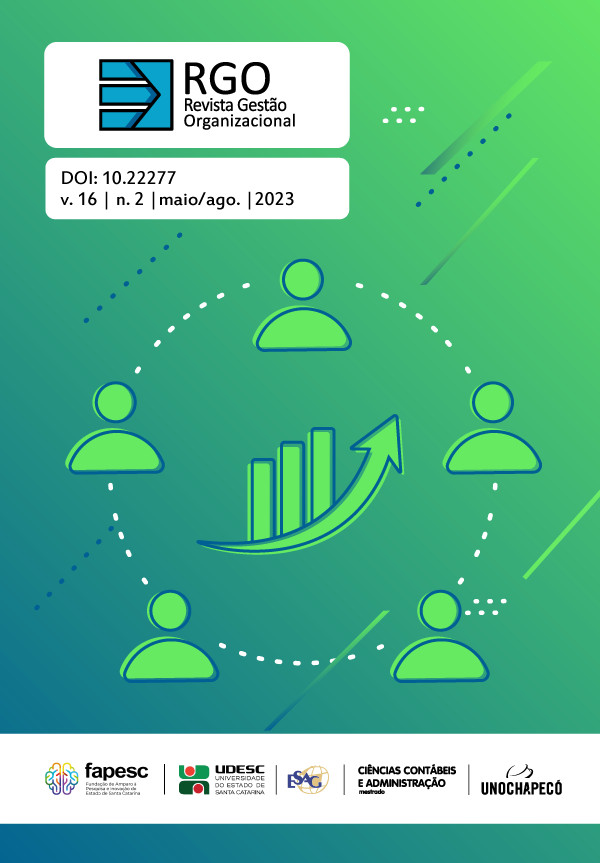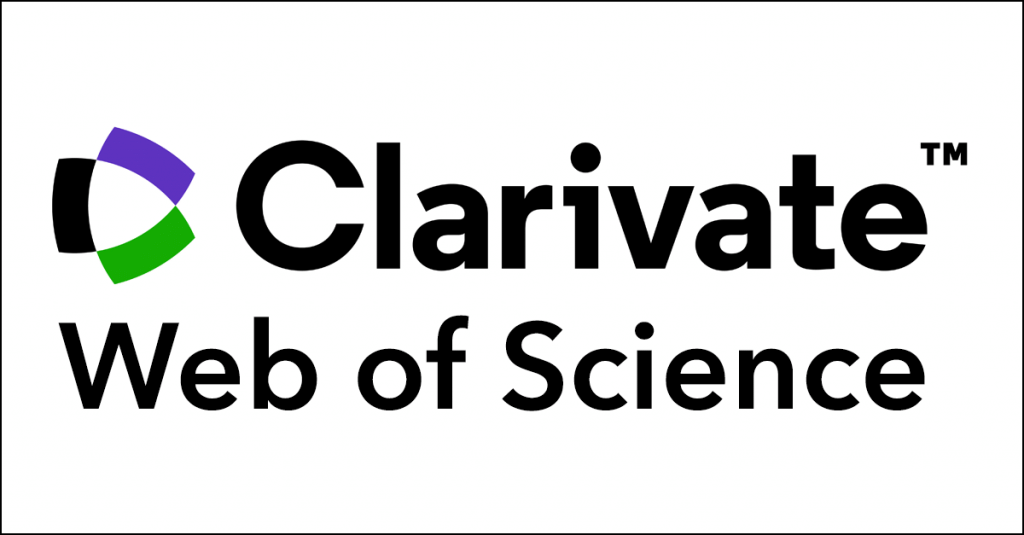GROUNDED THEORY ABOUT THE USE OF LEARNING MANAGEMENT SYSTEM (LMS) TO DISTANCE EDUCATION MANAGEMENT
DOI:
https://doi.org/10.22277/rgo.v16i2.6806Palavras-chave:
Distance Education Management, Learning Management System, Grounded TheoryResumo
Purpose: develop a substantive theory of factors influencing the use of Learning Management System in the management of Distance Education.
Method / approach: the Grounded Theory guided the methodological procedures in the light of Strauss and Corbin (2008), and ATLAS.ti Software was used for data analysis.
Mains findings: six factors were integrated around the central category, allowing the elaboration of the theory fundamental hypothesis and the establishment of causal and intervening conditions. The relational model, which consists of eight propositions, allowed the emergence of four consequences. The central category analysis revealed four sub processes, which involve its mechanisms of action/interaction. In addition, it was possible to identify external and internal contextual conditions that influence the mediation strategies in a sequence of four movements in three phases along time.
Methodological / social / managerial contributions: the research responds to the general theories about the use of LMS from the perspective of managers. Also, can represent an advance in the sense of contributing with a systemic view of the LMS as an administrative-educational mediator element, recognizing components, dynamics, and movement. The study can assist in the development of technological and management solutions based on business Intelligence systems (BI), big data, and learning analytics systems aligned to the LMS to improve distance education management.
Originality / relevance: the results will add up to this area research, showing implications of digital technologies use at distance education management process.
Downloads
Referências
Alonso, K. M. (2014). A EaD no Brasil: sobre (des) caminhos em sua instauração. Educar em Revista, 37-52. https://doi.org/10.1590/0104-4060.38643
Apramian, T., Cristhancho, S., Watling, C., & Ligard, L. (2016). (Re)Grounding grounded theory: a close reading of theory in four schools. Qualitative Research, 17(4), 359-376. https://doi.org/10.1177/1468794116672914
Bach, T. M., Domingues, M. J. C. de S., & Walter, S. A. (2013). Tecnologias da informação e comunicação no ensino: um estudo bibliométrico e sociométrico de 1997-2011. Avaliação: Revista Da Avaliação Da Educação Superior (campinas), 18(2), 393–416. https://doi.org/10.1590/S1414-40772013000200009
Balbé, M. M. G. (2003). A interlocução entre professor tutor e aluno na educação a distância. Educar, (21), 215-224. https://doi.org/10.1590/0104-4060.291
Bandeira-de-Mello, R., & Cunha, C. (2003). Operacionalizando o método da grounded theory nas pesquisas em estratégia: técnicas e procedimentos de análise com apoio do software ATLAS.ti. Paper presented at Encontro de Estudos em Estratégia, Curitiba, PR, Brazil.
Belloni, M. L. (2001). Educação a distância (2a. ed.). Campinas: Autores Associados.
Cheng, M., & Yuen, A. H. K. (2018). Student continuance of learning management system use: A longitudinal exploration, Computers and Education, 120, 241-253. https://doi.org/10.1016/j.compedu.2018.02.004
Cordeiro, A. M., Oliveira, G. M. de., Rentería, J. M., & Guimarães, C. A. (2007). Revisão sistemática: uma revisão narrativa. Rev. Col. Bras. Cir., 34(6), 428–431. https://doi.org/10.1590/S0100-6991200700060001
Galvão, C. M., Sawada, N. O., & Trevizan, M. A. (2004). Revisão sistemática: recurso que proporciona a incorporação das evidências na prática da enfermagem. Revista Latino-americana de Enfermagem, 12(3), 549–556. https://doi.org/10.1590/S0104-11692004000300014
Hong, X. (2011). On application of project management in distance education. Proceedings of E-Business and E-Government (ICEE), Shanghai, China. https://dblp.org/db/conf/icee/icee2010.html
Hraste, M. M., & Rodríguez, M. L. (2008). Las mediaciones pedagógico-comunicacionales de las prácticas en una propuesta de Enfermería a distancia. Ciencia, Docencia y Tecnología, (37), 33-63. http://www.scielo.org.ar/scielo.php?script=sci_arttext&pid=S1851-17162008000200003&lng=es&nrm=iso
Laurindo, F. J. B. (2008). Tecnologia da Informação: planejamento e gestão de estratégias. São Paulo: Atlas.
Lonn, S., & Teasley, S. D. (2009). Saving time or innovating practice: Investigating perceptions and uses of learning management systems. Computers and Education, 53, 686-694. https://doi.org/10.1016/j.compedu.2009.04.008
Macfadyen, L. P., & Dawson, S. (2010). Mining LMS data to develop an “early warning system” for educators: A proof of concept. Computers & education, 54(2), 588-599. https://doi.org/10.1016/j.compedu.2009.09.008
Matucheski, F. L., & Lupion, P. T. (2010). Potencialidades e limitações do ambiente virtual de aprendizagem em um curso on-line. Intersaberes, 5(10), 152-166. https://www.sumarios.org/artigo/potencialidades-e-limita%C3%A7%C3%B5es-do-ambiente-virtual-de-aprendizagem-em-um-curso-online
Mcgill, T. J., & Klobas, J. (2009). A task-technology fit view of learning management system impact. Computers and Education, 52, 496-508. https://doi.org/10.1016/j.compedu.2008.10.002
Mesquita, D., Piva Junior, D., & Gara, E. B. M. (2014). Ambiente virtual de aprendizagem: conceitos, normas, procedimentos e práticas pedagógicas no ensino a distância. São Paulo: Érica.
Moore, M. G., & Kearsley, G. (2007). Educação a distância: uma visão integrada. São Paulo: Thompson Learning.
Moran, J. M., Masetto, M., & Behrens, M. A. (2014). Novas tecnologias e mediação pedagógica. Campinas: Papirus.
Moré, R. P. O., Moritz, G. O., Pereira, M. F., & Melo, P. A. (2010). Modelo de gestão para educação a distância: o sistema de acompanhamento ao estudante - SAE. Revista de Administração e Inovação, 7 (2), 104-125. http://www.spell.org.br/documentos/ver/4004/modelo-de-gestao-para-educacao-a-distancia--o-sistema-de-acompanhamento-ao-estudante-----sae/i/pt-br
Murphy, C., Klotz, A. C., & Kreiner, G. E. (2016). Blue skies and black boxes: The promise (and practice) of grounded theory in human resource management research. Human Resource Management Review, 27(2), 291-305. https://doi.org/10.1016/j.hrmr.2016.08.006
Oliveira, P. C., Cunha, C. J. C. A., & Nakayama, M. K. (2016). Learning management systems (LMS) and e-learning management: an integrative review and research agenda. JISTEM - Journal of Information Systems and Technology Management, 13(2), 157-180. https://doi.org/10.4301/S1807-17752016000200001
Oliveira, P. C., & Nakayama, M. K. (2018). Grounded theory operationalization: the methodological route. Revista Pesquisa Qualitativa, 6(12), 572-594. http://dx.doi.org/10.33361/RPQ.2018.v.6.n.12.220
Ozdemir, Z. D., & Abrevaya, J. (2007). Adoption of technology-mediated distance education: a longitudinal analysis. Information & Management, 44 (5), 467-479. https://doi.org/10.1016/j.im.2007.04.006
Pinto, M. D. R., & Santos, L. L. D. S. (2012). A Grounded Theory como abordagem metodológica: relatos de uma experiência de campo. Organizações & Sociedade, 19, 417-436. https://doi.org/10.1590/S1984-92302012000300003
Rangel, F. O., Costa, H. A., De-Angelis, C. C. M., & Martins, R. L. (2015). Mediações online em cursos de educação a distância os professores de língua portuguesa em questão. Rev. Bras. Educ., 20 (61), 359-382. https://doi.org/10.1590/S1413-24782015206105
Rosini, A. M. (2014). As novas tecnologias da informação e a educação a distância (2a. ed.). São Paulo: Cengage Learning.
Santos, F. A. (2015). Tendências da educação a distância ou tendências da educação? In Ortiz, F. C., & Santos, F. A. (Orgs.). Gestão da educação a distância: comunicação, desafios e estratégias. São Paulo: Atlas.
Shaikh, A., & Karjaluoto, H. (2015). Making the most of Information technology e systems usage: a literature review, framework and future research agenda. Computers in Human Behavior, (49), 541-566. https://doi.org/10.1016/j.chb.2015.03.059
Silva, R. S. (2013). Gestão de EaD: educação a distância na era digital. São Paulo: Novatec.
Silva, D., & Guimarães, L. (2011). An experience of authorship, pedagogical mediation and research in DE (Distance Education). Cibertextualidades, (4), 129-140. http://hdl.handle.net/10284/2305
Strauss, A., & Corbin, J. (2008). Pesquisa qualitativa: técnicas e procedimentos para o desenvolvimento de teoria fundamentada (2a. ed.). Porto Alegre: Artmed.
Suddaby, R. (2006). From the editors: what grounded theory is not. Academy of Management Journal, 49 (4), 633-642. https://doi.org/10.5465/amj.2006.22083020
Tarouco, L. M. R., Moro, E. L. S., & Estabel, L. B. (2003). O professor e os alunos como protagonistas na educação aberta e a distância mediada por computador. Educar, (21), 29- 44. https://doi.org/10.1590/0104-4060.281
Taylor, S. J., Bogdan, R., & DeVault, M. (2015). Introduction to qualitative research methods: A guidebook and resource. John Wiley & Sons.
Zawacki-Richter, O., Bäcker, E. M., & Vogt, S. (2009). Review of distance education research (2000 to 2008): Analysis of research areas, methods, and authorship patterns. The International Review of Research in Open and Distributed Learning, 10(6), 21-50. https://doi.org/10.19173/irrodl.v10i6.741
Downloads
Publicado
Como Citar
Edição
Seção
Licença
Estou ciente de que, em sendo aprovado, a publicação do artigo será no formato on-line na RGO.
Também tenho ciência de que há autorização para assumir contratos adicionais separadamente, para distribuição não-exclusiva da versão do trabalho publicada nesta revista (ex.: publicar em repositório institucional ou como capítulo de livro), com reconhecimento de autoria e publicação inicial nesta revista.
Do ponto de vista do Creative Commons, a Revista Gestão Organizacional é de acesso aberto e irrestrito, porém não permitindo adaptações nos artigos, nem o uso comercial.
Sobre a licença Creative Commons: As licenças e instrumentos de direito de autor e de direitos conexos da Creative Commons forjam um equilíbrio no seio do ambiente tradicional “todos os direitos reservados” criado pelas legislações de direito de autor e de direitos conexos. Os nossos instrumentos fornecem a todos, desde criadores individuais até grandes empresas, uma forma padronizada de atribuir autorizações de direito de autor e de direitos conexos aos seus trabalhos criativos. Em conjunto, estes instrumentos e os seus utilizadores formam um corpo vasto e em crescimento de bens comuns digitais, um repositório de conteúdos que podem ser copiados, distribuídos, editados, remixados e utilizados para criar outros trabalhos, sempre dentro dos limites da legislação de direito de autor e de direitos conexos.
A Revista Gestão Organizacional adota o sistema: Atribuição-SemDerivações-SemDerivados CC BY-NC-ND: Permite o download dos seus trabalhos e o compartilhemento desde que atribuam crédito, mas sem que possam alterá-los de nenhuma forma ou utilizá-los para fins comerciais.























